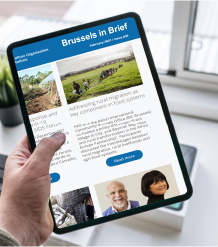Resources
Photos
Videos
Publications and Newsletters

Proceedings of the Sixth International Carp Conference-Szarvas, Hungary, on 31 August–1 September 2023
29/07/2024
The Sixth International Carp Conference was organized in Szarvas, Hungary, on 31 August–1 September 2023. The conference was attended by 114 participants from 14 countries, representing a range of carp value chain stakeholders. The conference aimed to strengthen the “carp segment” within European aquaculture, improve the image of carp pond aquaculture as common European heritage, and to explore the opportunities for carp within “blue aquaculture”.

The State of Food Security and Nutrition in the World 2024
24/07/2024
The report provides a long-awaited definition of financing for food security and nutrition and guidance for its implementation. Establishing a common definition of financing for food security and nutrition, and methods for its tracking, measurement and implementation, is an important first step towards sustainably increasing the financing flows needed to end hunger, food insecurity and all forms of malnutrition

The State of the World’s Forests 2024
22/07/2024
This edition of The State of the World’s Forests (SOFO) provides highlights on the state of the world’s forests and explores the transformative power of evidence-based innovation in the forest sector, ranging from new technologies to creative and successful policies and institutional changes, to new ways of getting finance to forest owners and managers.

FAO Animal Production and Health Annual report 2023
19/07/2024
The 2023 Annual Report of the FAO Animal Production and Health Division (NSA) provides in-depth information, highlights, and stories related to FAO's work on livestock production, animal health, and One Health in 2023, including the organization of the first-ever Global Conference on Sustainable Livestock Transformation.

Understanding microfinance interest rates in agrifood
19/07/2024
Interest rates have been a contentious issue in microfinance for many years. While higher interest rates for microloans are often justified by the underlying costs of making small loans in rural areas, this is not always the case.

Protecting the right to adequate food and saving lives in the Gaza Strip: Briefing note on the Occupied Palestinian Territory
18/07/2024
The note explains the fundamental principle of food as a human right, outlining the obligations of States to safeguard this entitlement. It explores how the right to food is applied in contexts of armed conflict and occupation, assessing the current conditions in Gaza against the backdrop of binding legal obligations and international legal precedents.

Nicaragua: Belgium’s contribution through the Special Fund for Emergency and Rehabilitation Activities (SFERA)
01/07/2024
To mitigate the adverse impacts of El Niño on people’s lives and livelihoods in Nicaragua, the Food and Agriculture Organization of the United Nations has received financial support from the Government of the Kingdom of Belgium, through the Special Fund for Emergency and Rehabilitation Activities. The generous contribution will enable FAO to provide staple crop and vegetable seeds along with fertilizers to farming households affected by recurrent extreme climate events over the past three years.

Previous newsletters
2024: January, February, April, May, June, July
2023: January, February, March, April, May, June, July, October, November
2022: January, February, March, April, May, June, July, September, October, November, December
2021: January, February, March, April, May, June, July, September, October, November, December
2020: January, February, March, April, May, June, July, September, October, November, December
2019: January, February, March, April, May, June, July, September, October, November, December
2018: April, May, June, July, September, October, November, December








f77f2ced-8484-4196-a923-4385333499fc.jpeg?sfvrsn=1d103f26_1)

